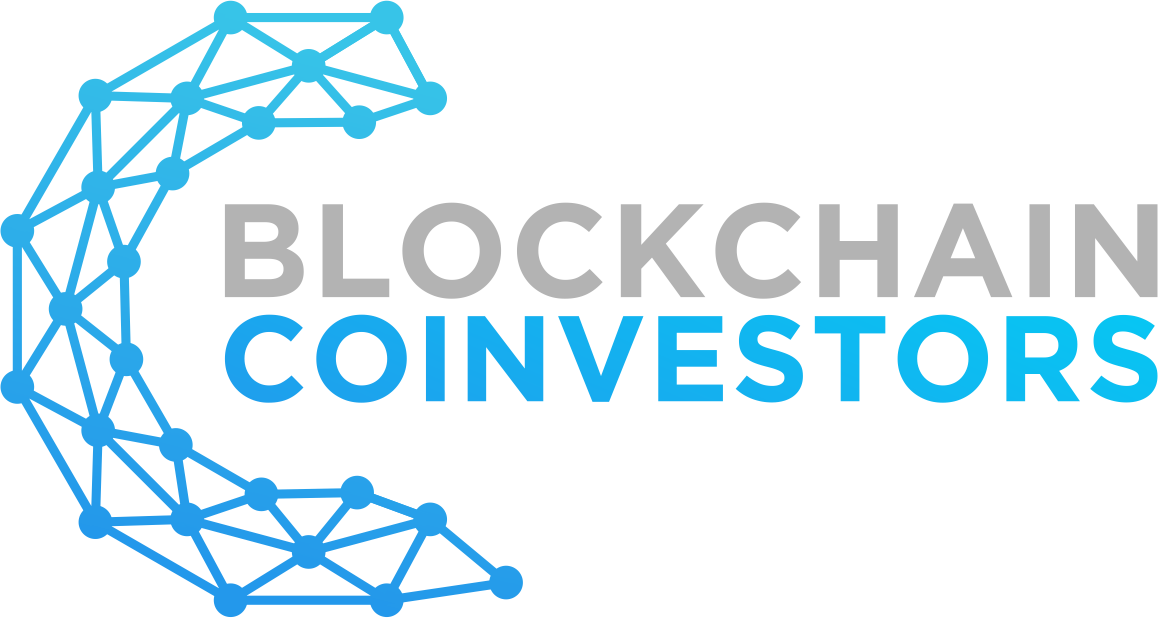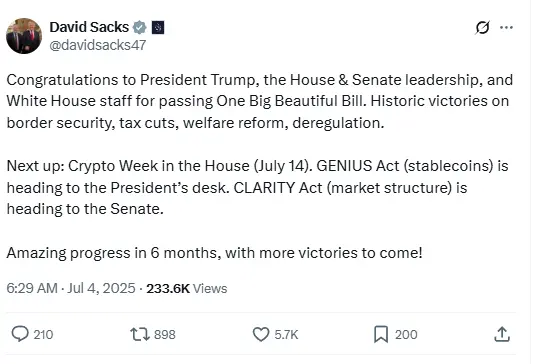How the United States' OBBBA Might Accelerate the Growth of Blockchain and AI Technologies
How the United States' OBBBA Might Accelerate the Growth of Blockchain and AI Technologies
In Exhibit 1 below, we share the US Blockchain and AI Czar, David Sachs' social post in which he both congratulates the leadership of the US on the passing of the One Big Beautiful Bill Act (OBBBA) and highlights the importance of the week of July 14th in which the US GENIUS Act (stablecoins) and the US CLARITY Act (market Structure) will get attention in Congress.
For this week's newsletter, we are focusing on the intersection of the two.
How does OBBBA likely accelerate the growth of Blockchain and AI technologies, and how does this impact our investment strategies - both at Blockchain Coinvestors, and now at the newly launched AI Coinvestors investment strategy.
While we can’t share specifics in a public newsletter, feel free to email us at IR@BlockchainCoinvestors.com.
What is the One Big Beautiful Bill Act?
The One Big Beautiful Bill Act (OBBBA), passed on July 4, 2025, is a landmark piece of legislation crafted by Republican leadership under President Trump’s administration. Conceived as an all-encompassing legislative achievement heading into the 2026 midterms, the Act touches nearly every aspect of government policy—streamlining tax codes, enhancing border security, overhauling federal procurement, and making historic investments in American infrastructure, energy, and digital modernization.
Five Ways in Which OBBBA Accelerates Blockchain and AI Adoption
Originally drafted with several emerging technology provisions, the final version of OBBBA notably excluded specific blockchain and crypto-friendly amendments. Among the most prominent casualties were Senator Cynthia Lummis’s proposed de minimis exemption for crypto transactions under $600 and clarifications regarding staking and lending tax treatment. These removals reflect ongoing divisions within Congress about digital asset policy.
Nevertheless, the bill’s structural components—spending programs, modernization mandates, and regulatory simplification—still provide significant indirect support for blockchain and AI adoption. Specifically:
Persistent Federal Tax Cuts and Economic Tailwinds. OBBBA locks in and extends the 2017 Tax Cuts and Jobs Act, including reduced corporate tax rates, accelerated depreciation, and higher pass-through deductions all providing stimulus to investing in businesses and specifically US economic activity.
Clean Slate for Crypto—No Perks, No Surprises. While some in the blockchain community saw the exclusion of crypto-specific reforms as a loss, it also provides a stabilizing clarity. For four years we lived under a regime in which any and every Act of congress might include grenades and bombs for our industry - this Act has none.
Indirect Stimuli Through Infrastructure and Tech Modernization. One of OBBBA’s core thrusts is the revitalization of American infrastructure—not just roads and bridges, but also digital systems, utilities, energy grids, and logistics networks. This is of course the most important stimulant to the innovations that we focus on - Blockchain and AI. Both are now ready to be part of the next wave of US infrastructural development.
Hands-Off Regulatory Posture Toward Emerging Technology. The final OBBBA removed controversial proposals for federal AI moratoriums, as well as invasive regulatory commissions for digital infrastructure. This streamlining will help accelerate the adoption of AI by government and private sector initiatives.
Federal Procurement as an Unspoken Accelerator. While the bill doesn’t explicitly mention blockchain, its procurement directives for upgrading federal agency IT systems, logistics, and reporting open the door for adoption, and of course AI will be the big winner in every one of these procurement directives.
The framework provided by OBBBA to now undertake significant and rapid initiatives to modernize US government platforms and infrastructure will, we believe, usher in a period of significant capital investment into Blockchain and AI as foundational technologies for government solutions.
Implications for Sovereign Blockchain Pilots and the U.S. Bitcoin Reserve
OBBBA’s passage coincides with parallel developments that greatly impact the sovereign Blockchain landscape. Chief among these is the pending Deploying American Blockchains Act of 2025 (H.R. 1664), which empowers the Department of Commerce to launch blockchain pilot programs across agencies
Early adopters are already making moves. Just as examples:
California DMV is issuing vehicle titles on an Avalanche subnet.
State Department's International Humanitarian Assistance Bureau is preparing to issue and track foreign aid on-chain.
In parallel, Executive Order 14233, issued in March 2025, established the U.S. Bitcoin Reserve.
Implications of OBBBA for AI Infrastructure and Investment in the U.S.
While OBBBA did not include explicit directives on artificial intelligence, its broader policy framework has significant downstream effects on AI infrastructure and investment across the United States. By extending favorable tax treatment for capital expenditures and permanently lowering corporate tax rates, OBBBA creates powerful incentives for companies to invest in data centers, AI compute hardware, and machine learning model development.
The Act’s rejection of proposed federal AI moratoriums and centralized regulatory commissions reflects a pro-innovation stance, allowing states and private enterprises to continue advancing AI capabilities without new national restrictions. This decentralized regulatory posture has reassured venture capitalists and institutional investors who had feared preemptive federal constraints on frontier model training.
Moreover, OBBBA’s emphasis on digital infrastructure modernization—including broadband expansion, government IT overhaul, and energy grid resilience—lays the groundwork for a robust, distributed AI ecosystem. These investments support edge computing, AI-as-a-service, and real-time inference systems critical to sectors such as defense, logistics, and health care.
Taken together, OBBBA positions the U.S. as an AI infrastructure leader, encouraging both foundational research and commercial deployment at scale—especially in regions benefiting from infrastructure grants and energy subsidies. It also sharpens the competitive edge of American firms in the global AI race by ensuring a permissive legal, fiscal, and logistical environment.
Implications for Blockchain and AI Venture Investors
How does all of this impact our early stage venture investment strategies - Blockchain Coinvestors and AI Coinvestors? Our top five answers:
Stable Policy Environment Spurs Confidence. Investors now operate in a more stable macro-regulatory climate. The OBBBA didn’t introduce Blockchain-specific rules, but it also didn’t attack digital assets. Meanwhile AI was clearly a big winner.
Redirection of Capital Into Infra and GovTech-Aligned Plays. With speculative DeFi models under pressure and crypto tax breaks off the table, capital will likely pivot toward infrastructure and enterprise-focused blockchain ventures which are one of our core investment themes and focus areas.
New Federal Procurement and Grant Pathways. OBBBA unlocks billions in modernization funding. Blockchain ventures are positioned to plug into procurement—particularly through partnerships with system integrators. Again AI will be ubiquitous in these procurement activities.
Acquisition and Exit Pathways Reopen. Government demand for modern, interoperable systems may trigger M&A across the IT and security landscape, and we are seeing a large number of roll-up acquisitions already taking place in our industries.
Deeper Advocacy for Standalone Blockchain Legislation. The omission of Senator Lummis’s crypto-friendly provisions reminds investors that true reform must come through dedicated digital asset legislation. As David Sachs notes, the week of July 14th in Washington will be Crypto Week.
Once again, we see headwinds being transformed into tailwinds, and could not be more bullish for what all of this means for our investment strategies.
Conclusion
Though the One Big Beautiful Bill Act of 2025 did not include specific Blockchain or Crypto provisions, it nonetheless marks a significant moment for the adoption and growth of Blockchain and AI technologies. By stabilizing tax and regulatory conditions, funding broad digital modernization, and clearing the way for sovereign pilots and reserve-backed experiments, OBBBA effectively sets the stage for a blockchain and AI integrated US economy.
The message is clear: While the path may not include flashy tax breaks or headline reforms, the ground beneath Blockchain and AI in the U.S. just got much more solid—and the foundations for long-term growth are in place.
What's Next?
Please reach out to us to hear more about this new acceleration in Blockchain and AI. We are constantly working to provide early stage diversified access to Blockchain ventures and into AI and the Future of Intelligence and Computing so please reach out at IR@BlockchainCoinvestors.com to discuss further.
Thank you for reading,
The Blockchain Coinvestors Partners
About Blockchain Coinvestors
Blockchain Coinvestors invests in blockchain businesses. Our vision is that digital monies, commodities, and assets are inevitable and all of the world’s financial infrastructure must be upgraded. Our mission is to provide broad coverage of early stage blockchain investments and access to emerging blockchain unicorns. Blockchain Coinvestors’ investment strategies are now in their 12th year and to date we have invested in a combined portfolio of 1,250 blockchain companies and projects including more than 110 blockchain unicorns. Visit us at www.BlockchainCoinvestors.com to learn more.
“We invest in blockchain businesses”



